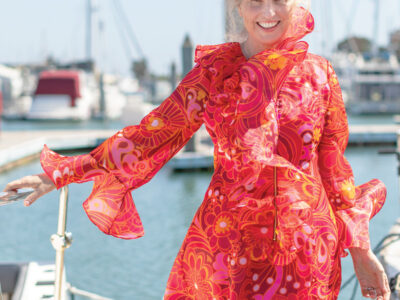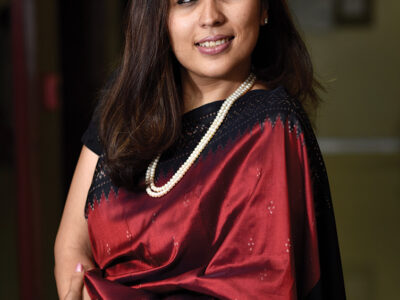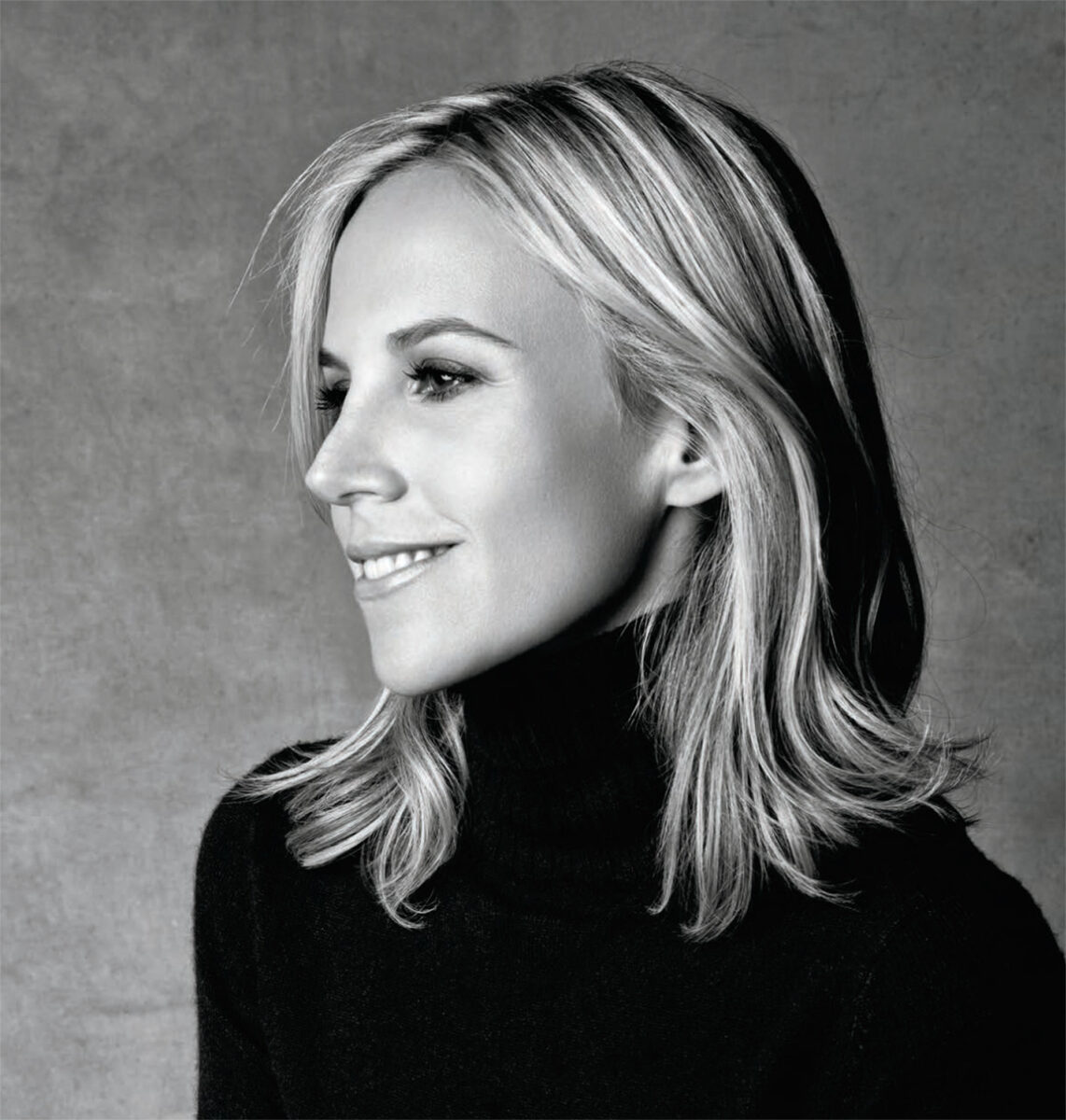
Less than a decade after launching her own label, Tory Burch C’88 is one of the most recognizable names in fashion. Through mentoring and microloans, the Tory Burch Foundation is empowering other women entrepreneurs to follow in her footsteps.
By Kathryn Levy Feldman
Photograph by Patrick Demarchelier
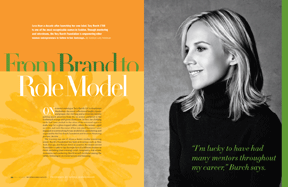
On a recent evening at Tory Burch LLC in downtown Manhattan, the resort collection of bright, classic, and preppy-chic clothing and accessories was not getting much attention from the 75 women gathered in the trademark orange-and-green showroom. In fact, the clothing racks had been pushed to the sides of the mirrored space to make way for 11 glass-topped tables, where the women—aged 20 to 60, and each the owner of her own small business—were engaged in a networking forum modeled on speed dating and organized by the Tory Burch Foundation and its micro-financing partner, Accion.
The evening was one of about a dozen similar mentoring events Burch’s foundation has held in locations such as New York, Chicago, and Hawaii. Every 20 minutes, the women moved from table to table to tap the expertise of a different mentor in fields including (that evening) retail, hospitality, real estate, insurance, and marketing. Burch herself circulated among the tables, listening in on conversations and beaming.
“For our mentoring events, we focus on inviting business leaders from diverse fields our entrepreneurs need help with,” she explains. Participants in the “Friends of Tory” network include such high-powered figures as J. Crew chairman and CEO Millard Drexler and author and Morning Joe co-host Mika Brzezinski. This particular evening, Cindi Leive, editor-in-chief of Glamourmagazine, and the CEO of jeweler David Yurman, Glenn Senk, are on hand, among others.
The focus is all business. Constance Sherman, whose “Hot Girl Pearls” have been featured on The View television show, wants to know about going global. The owner of a teen/tween party business that operates out of a storefront contemplates marketing on a non-existent budget. A jewelry designer and recent transplant to New York wonders if she should revamp her entire line or try and market her original designs in the city. However useful the advice of the expert mentors, according to Burch the true value of the sessions is that the women will learn just as much from each other.
“There is the Madeleine Albright quote that goes, ‘There is a special place in Hell for women who do not help other women,’” says Glamour’s Leive. “Well, Tory’s definitely not going to Hell!”
It wasn’t concern for her afterlife that motivated Tory Burch C’88 to decide in 2009 to establish her own foundation; and she wasn’t out merely to do good works, either. Providing mentorship and microfinancing opportunities is “not charity; it’s empowerment,” she told CNN Money in 2011. “It’s an investment in our collective futures.”
Rather, it was Burch’s firsthand experience of the difficulties women face in simply having their aspirations taken seriously, let alone getting financing for a start-up, that led her to create a program specifically geared toward helping women entrepreneurs in the US. “It’s much easier for a woman in a developing country to get a microloan than it is here,” Burch told Fast Company, when the magazine named her to its League of Extraordinary Women in June. “Early on, it was just the way potential investors were a little condescending. I felt that from the beginning. There was a stigma attached to being a woman in business. I think it’s about the ambition.”
Certainly she has demonstrated hers. Just eight years after launching her own fashion line, she has created a global lifestyle-brand: Tory Burch merchandise is sold in more than 1,000 department and specialty stores as well as 80 national and international stand-alone boutiques. In 2008, Burch won the Council of Fashion Designers of America award for Accessory Designer of the Year. Sales this year should exceed $800 million and rumors of going public have been circulating for about a year.
“She started her business at a kitchen table in her apartment with kids running around,” says Glenn Senk, who has also served as chief executive at Urban Outfitters and Anthropologie. “Every good business I know starts at a kitchen table or in a garage.” On top of that, he adds, Burch has all the qualities of a true entrepreneur: she is passionate about her vision, she is scrappy, and she works 24/7. “You can send Tory an email at 5 a.m. or at 11 p.m. and she answers it within a half hour,” he confides.
“Sadly, it’s true,” Burch admits.
Such dedication belies the Main Line-born socialite-turned-fashionista that Burch is often portrayed as being. Despite speculation that she owes her success to the deep pockets of her socially prominent friends and her ex-husband, financier Christopher Burch, with whom she has three sons, the truth is that she is extremely good at what she does.
Burch “seems to have an infallible instinct for what resonates with female consumers across class and age divides,” says Sally Singer, editor of The New York Times Style Magazine.
That sixth sense is coupled with a near-constant, focused drive to deliver new goods that both expand and reinforce her consistent vision. “Tory turned her unique view of the world into a business,” Senk elaborates. “She shared the way she lives with the world.”
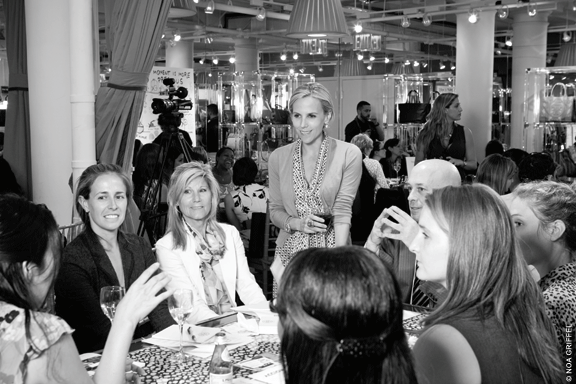
Tory Robinson grew up in Valley Forge, Pennsylvania, on a 35-acre “gentleman’s farm” with three brothers, Robert, James, and Leonard. A self-professed tomboy, she credits her parents with instilling the fashion sense that has fueled her designs.
“My style has always been classic, but I have to say my parents were my greatest influence,” she says. “They wore timeless, elegant pieces mixed with very personal details. My father [the late Ira Earl “Buddy” Robinson W’43] had his jackets lined with Hermès scarves, and my mother always brought back incredible pieces from her travels. I started experimenting with a balance of classics and more eclectic pieces in college.”
The sunflower emblem of the Tory Burch Foundation pays tribute to that parental influence—it’s based on one of the pieces of jewelry Burch’s father designed for her mother, a sunflower pendant that Tory herself now cherishes and often wears. Her mother, Reva—after whom Burch’s wildly popular line of ballet flats is named—remains a mentor. Singer notes that Burch is “ready at a moment’s notice to break into praise of her mother’s talents as an organizer of holiday festivities and organic farming.”
Burch attended the all-girls Agnes Irwin School in Bryn Mawr, where she was a formidable tennis player. When it was time for college, Penn was “absolutely [my] first choice,” she says. She fondly remembers classes in art history, her major, with David Brownlee (currently the Frances Shapiro-Weitzenhoffer Professor and chair of the graduate group in the History of Art), as well as in sociology with the late E. Digby Baltzell W’39 Hon’89—and was one of the founding members of the Kappa Alpha Theta sorority.
During her junior year, Burch participated in a Semester at Sea program. “I traveled to 14 countries and saw a side of poverty I’d never seen,” she says, which is where her commitment to give back was inculcated. From that point on, she says philanthropy and education were always a part of her vision.
Not that this approach was always welcomed. Early on, one of her investors advised her to “never bring up philanthropy and business in the same sentence.”
“Philanthropy was thought of as women doing charity benefits—very Junior League,” she said in the Fast Company interview. “But I thought—and people are now thinking—that business and philanthropy and doing good really do go hand-in-hand.”
After Penn, Burch got her first job an assistant working for the Yugolslavian fashion designer Zoran—from whom, she says, she “learned about the elements of running a small design atelier”—and followed that with an editorial stint at Harper’s Bazaar, where she was “exposed to some of the most creative people in fashion.” Next she moved into the public-relations side of the fashion industry, working for Ralph Lauren (“where I discovered the importance of marketing and story-telling”), Vera Wang (“which was about to expand a brand”), and Madrid-based fashion house Loewe (“where I observed Narciso Rodriguez’s laser-sharp focus on impeccable tailoring and fit”).
In 2004, armed with these experiences—but no formal design or business training—Burch decided to launch her own label, which would offer what she calls “great American sportswear with a more global point of view.” Her first store—at 257 Elizabeth Street in the Nolita (North of Little Italy) neighborhood of Manhattan—both created and expressed Tory Burch, the lifestyle, from the moment one walked through the now-signature orange lacquer doors. Burch’s stylish, classic, and—relatively—affordable clothing and accessories coordinated perfectly with the mirrored walls and the tasteful, but never trendy, appointments of an upscale home. From the get-go, the Tory Burch brand resonated powerfully with customers. In a tale that has become legendary in the fashion industry, the store’s inventory was sold out by the end of its opening day.
By the end of 2012, Burch will have opened 25 new stores, each unique to its neighborhood and clientele but all emanating that same ethos. “We are opening about 10 more stores in the Middle East, Asia, Canada, and the US this year,” she says. “Everyone on our team is also excited for the launch of our fragrance in Fall 2013.”
Burch’s satisfaction at the meteoric rise of her fashion star has been tempered with her self-professed difficulty in “having it all.”
“Starting out I faced challenges with time, resources, and most of all, work-life balance,” she admits. “I would put my three sons to bed and then get on a call with our Hong Kong office until 4 a.m. It was totally exhausting, but it was worth it because I was passionate about what I was doing.”
Today, she makes it clear that her family is her first priority. “My boys and [three] step-daughters come first and everything falls into place after that,” she declares, even as she acknowledges on her blog that “balancing work and family” remains her biggest challenge.
Brooklyn-based jewelry designer Natasha Wozniak knows from passion and exhaustion. In 2010, after being in business for nine years, she was feeling the pinch of the economic downturn. “There was a huge drop-off in sales, and I had used credit-card financing to get me through,” she recalls. A Facebook post by a woman who runs a trade show at which Wozniak exhibited alerted her to the availability of microloans from Accion, the largest microfinance provider in the US. “She obviously realized that a lot of people who exhibit with her were hurting,” Wozniak says.
Wozniak’s application to Accion for a loan to refinance her debt was one of the first to be financed by the Tory Burch Foundation. Accion administers the loans, which range from $5,000 to $50,000, while Burch provides the start-up financing and ongoing mentorship opportunities. It is a partnership, says Accion CEO Paul Quintero, that “kickstarts the growth of women entrepreneurs. Combining the knowledge gained from the foundation’s networking and coaching events with the capital quickly provided by Accion ensures the quick implementation of ideas and opportunities for growth.”
“We are very thoughtful about the organizations with which we collaborate and are aligned,” notes Tory Burch Foundation Director Terri McCullough, who used to be chief of staff and adviser to former House Speaker Nancy Pelosi, where her focus was on policies affecting women and families. The foundation has also partnered with the US State Department’s African Women’s Entrepreneurship Program; Goldman Sachs’ investment programs, 10,000 Women and 10,000 Small Businesses; and the Fortune magazine/US State Department Global Women’s Mentoring Partnership in hosting mentoring events in New York as well as Morocco. The foundation also works with the Women’s Initiative for Self-Employment, a national microenterprise training and funding organization.
In fact, it was a partnership with Global Philanthropy—a network for those seeking to start a foundation—that connected them to Accion. “We never wanted to get into the business of being a bank,” says McCullough.
McCullough says that the foundation was funded in part by a direct contribution from Burch as well as net proceeds from products specifically designed to support it. These products, some of which are designed by emerging artists in limited editions, can be found in stores and online.
According to Alejandra Boggiano, communications manager for Accion, since its inception the Tory Burch Foundation has made 66 loans, averaging $7,000 each. “It doesn’t seem like a lot but it is often that little bit that makes a difference,” she says. Interest charged on the loans has ranged from 6 to 15.9 percent and the average payback time is two years. The default rate has been “extremely low,” says Foundation Director McCullough.
There were more than 8.1 million women-owned businesses in the US as of 2011, according to a report commissioned by American Express OPEN, the company’s credit card for businesses. That figure represents a 50 percent increase since 1997. Many of these women-owned businesses are microenterprises—meaning having fewer than five employees and capital needs under $35,000—whose owners find it very difficult to obtain financing. Similarly, data from FIELD at the Aspen Institute, a think-tank focusing on best practices in microenterprises, shows that, of the approximately 22 million self-employed microentrepreneurs in the US, more than 10 million lack access to business capital—and they are predominantly women and minorities.
“We like to think of ourselves as banking done differently,” notes Accion’s Boggiano. “Many of our clients don’t qualify for traditional loans because they may not have credit scores or because the amount they need is too small for large banks to consider. We take that extra step. We do more than just give clients a loan; we help them succeed.”
When it comes to going that extra step, the relationship between the Tory Burch Foundation and Accion is “a match made in heaven,” according to Boggiano. “Tory goes above and beyond with the women who are funded by Accion.”
Case in point: Wozniak, who gained invaluable expertise from one of Burch’s mentoring sessions. “I was at a crossroad, contemplating whether or not to sell directly to clients on the Internet or to continue selling my jewelry wholesale to department stores,” she recalls. “I mentioned this to Lisa Caputo, executive vice-president of global marketing and corporate affairs for Citigroup, who was a mentor that evening.” (Caputo has since moved on to Travelers Insurance.)
“She looked at me and said, ‘Why are you even thinking about it? Can you do it tomorrow?’ She felt that I needed to put my energy into working directly with customers, which is a less expensive way to run my business because I could focus on a higher-end clientele. It was the last push I needed to make the decision to get into e-commerce.”
In 2010, cousins Undra Duncan and Shekima Francois received a loan from the Tory Burch Foundation to help with the production of their handbag line. Less than a year later, their company (aptly named Cousin & Co.) had signed on with a New York showroom and received orders from Searle, a prestigious department store in New York. “Tory has been amazingly accessible to us,” Duncan says. “Earlier this spring we had a one-on-one breakfast with her and she put us in contact with her PR team as well as the head of handbags at her company. That was beyond generous, and she has continued to make herself as well as her team available to us.”
All of which is music to Burch’s ears. “I’m lucky to have had many mentors throughout my career,” she says. “One of the ideas they all reinforced is that it’s important to be a steadfast information-gatherer in each job. It will ultimately help you find the work you’re the most passionate about.”
“Tory is deeply committed to helping other women succeed as she had,” seconds McCullough. “In fact, the foundation is deeply integrated into the ethos of the company and is an important part of who she is and who the company is.”
In the middle of a hectic schedule of fittings for her fashion show during New York’s Fall Fashion Week, Burch made it a point to detail Wozniak’s success to me in an email: “With a small loan from our foundation, she was able to grow her business and website, www.natashajewelry.com, and is thinking about hiring employees. Her collection is now sold online and in 16 retail locations across the US.”
Aside from their corporate bottom lines, these women have also been deeply influenced by Burch’s work ethic, determination, and business acumen. “I didn’t think it would be this hard even when you have such a great mentor as Tory,” notes Duncan. “I can’t even imagine what it would be like without her.”
“If I really needed Tory to access a person, I know she would make the connection for me,” seconds Wozniak.
According to Boggiano, about 70 percent of the women who attend a Tory Burch Foundation mentoring event know about the loan program, while the rest are introduced to it that evening. Many come more than once. The advice and connections are invaluable at all stages of business development. The Tory Burch Foundation funds microloans to both startups and established businesses.
“Interacting with her and others has taught me about getting help,” Wozniak continues. “Here I was trying to figure it all out by myself. I realized that investing in my personal development helped the business develop and improved everything that I do.”
Kathryn Levy Feldman LPS’09 is a freelance writer and frequent Gazettecontributor.



